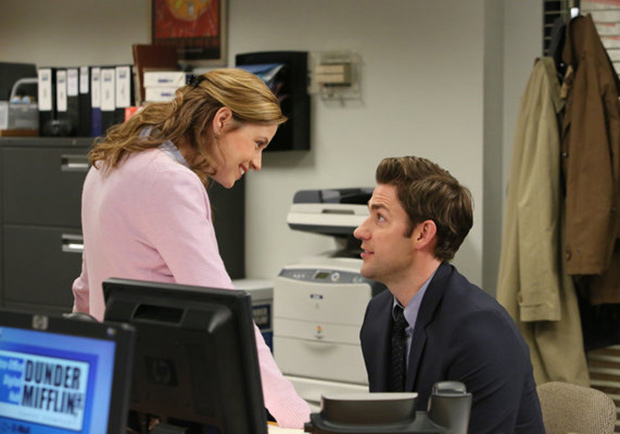For me, it wasn't love at first sight. The first time I ever watched The Office, the scenes felt awkward and the staff of Dunder Mifflin seemed weird. But it didn't take long before I fell for those quirky characters, and I've been watching ever since.
Sure, The Office has been through its ups and downs (most notably, the departure of Steve Carrell as Michael Scott), but in its ninth and final season the show has gained momentum by way of two characters whose relationship hooked us from the very beginning: Jim Halpert and Pam Beesly.
Ever since the two exchanged witty flirtations during Season 1, viewers have been rooting for them. We watched as the two fell in love, married, and had children together. Then in this final season, we got a rare look at the strains placed on a marriage by shifting life circumstances.
Although Jim and Pam have a beautiful love story, it is their endurance that sets them apart. In today's pop culture, we don't typically see the "ever after" of a fictional couple's story. Once two lovers overcome adversity and finally unite, we are left to assume that the rest will just work itself out. Nevermind that their relationship was founded on deception (as in How to Lose a Guy in 10 Days, Hitch, or Failure to Launch), nevermind that he was once a serial philanderer (Two Weeks Notice, What Women Want, and Crazy, Stupid Love), and nevermind that neither he nor she has a clue about healthy communication (The Proposal, The Ugly Truth, and Sweet Home Alabama). If they get together before the credits hit, we easily forget the complicating factors and celebrate the happy ending.
In this regard, TV doesn't fare much better than movies. Series finales often end with a wedding, or the promise of one to come. But Season 9 of The Office offered a refreshing change of pace and a much fuller picture of marriage. Jim and Pam are a great match and they are truly committed to each other, but happiness hasn't come easily. Their marriage is tested by the pressures of career and family, and viewers were left to wonder if the relationship would collapse.
What makes the Halperts' struggle compelling is that it was inspired not by TV tropes, but real life. The actor who plays Jim, John Krasinski, watched his brother endure the marital strain of work-related travel and pitched the scenario to the show's creator, Greg Daniels. Consequently, Jim took a job in Philadelphia while Pam continued to work at Dunder Mifflin, and the two were long-distance for the majority of Season 9.
As we eventually learned, the arrangement took a toll on the seemingly unflappable pair, especially on Pam. By the second half of the season Pam felt abandoned and began to check out emotionally. Once the couple recognized the gulf that had developed between them—a gulf that viewers could feel through their short phone conversations and pained expressions—they sought marriage counseling. But that too was a challenge. Too much time had passed. As Pam wistfully remarks in one episode, "I wish we'd started this six months ago. My heart just feels so…blocked up."
Like many couples on this side of the TV screen, Jim and Pam faced the additional challenge of seeking marriage counseling after they already had significant problems. As a result, their therapy was fraught with bitterness and hurt feelings, manifested as sarcasm, over-defensiveness, and stifled communication. Only a single episode was devoted to their counseling exercises, after which we were led to believe that Jim and Pam had turned a corner, since Jim ultimately decided to return to Scranton. In an otherwise believable plotline, this is perhaps the least realistic aspect of the story. When wounds are left to fester, it can take weeks, months, and even years to heal.
Even so, Jim and Pam's journey serves as a powerful example. Even a terrific couple with great chemistry and a romantic love story has to work on their marriage. Going to marriage counseling did not mean they were weak or crazy; it meant they were wise. It meant they were living out their vows.
Critics disagree about the value and place of Jim and Pam's marital strife on the show. Some feel the subplot is unconvincing and too rushed; others argue that it is the show's salvation. I tend to agree with the latter. In a show that frequently indulges in the absurd, Jim and Pam's storyline has anchored it in a powerful truth: marriage is hard, and it takes work. Apparently this reality is news to Americans, as evidenced by the scandalized responses to Ben Affleck's admission that marriage takes effort. But it's true; a romantic fairytale is not self-sustaining. I am grateful that The Office normalized this experience.
In tonight's series finale, The Office relies on the age-old formula of ending with a wedding. This time, Dwight and Angela will walk down the aisle. Their love story isn't as cute or conventional as Jim and Pam's, but I suspect that, had the series continued, they too would have faced marital troubles of their own. If that fictional world did exist, and I could offer the newlyweds one piece of advice, it would be these words from Proverbs 11:14: "In an abundance of counselors you will succeed." Jim and Pam learned that truth the hard way, but I'm glad they ultimately did. It's a lesson that so many of us need to hear.









